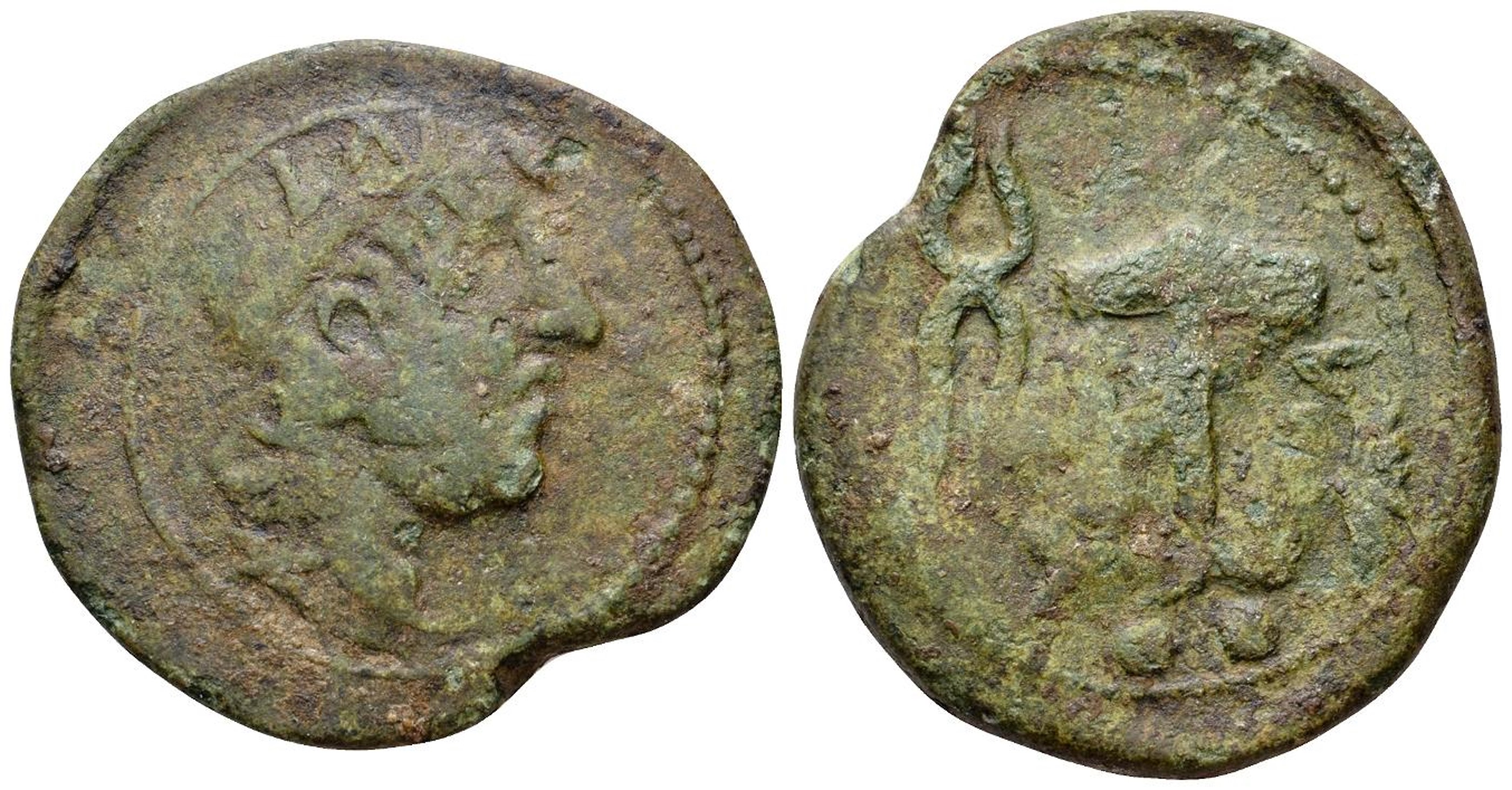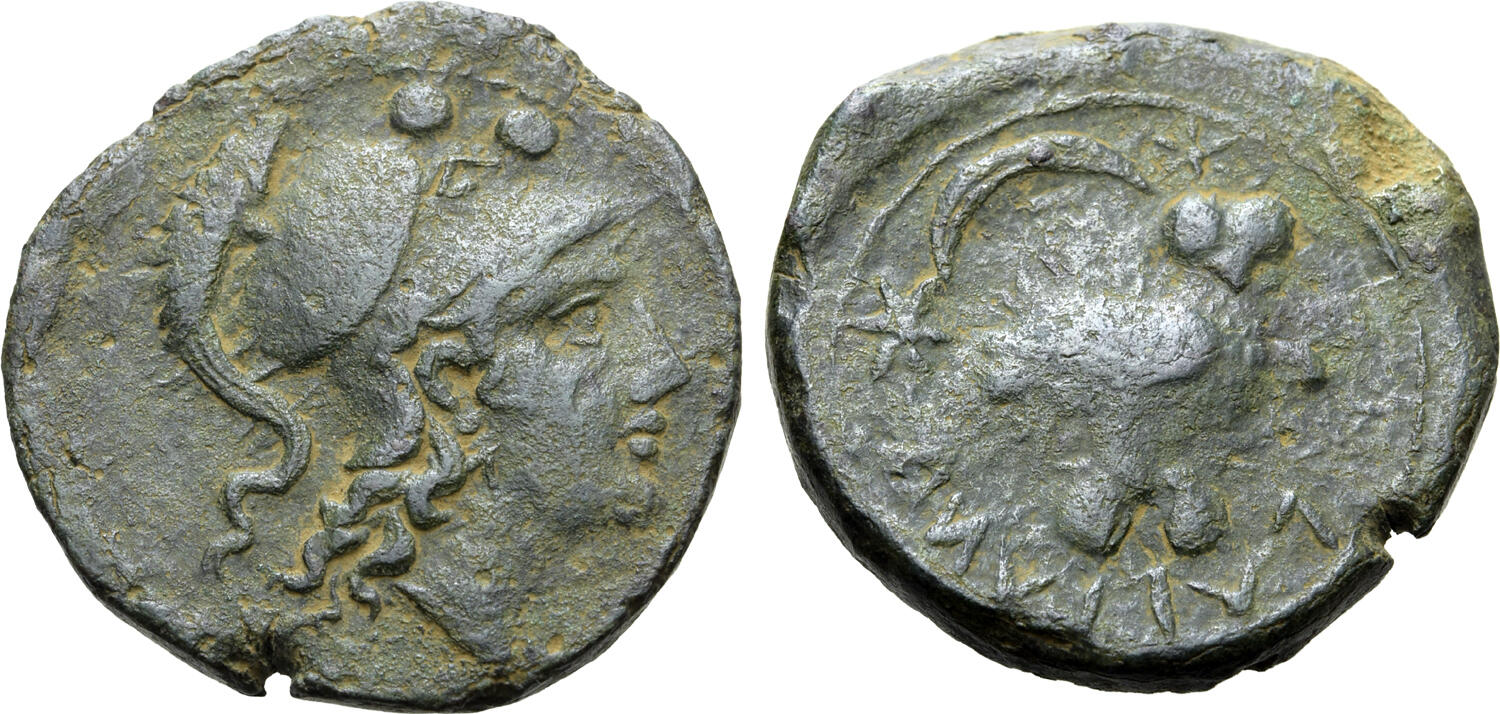220 BCE - 200 BCE | pvplvna
Overstriking coin
Populonia_1563_Roma.jpg
[1]
Overstruck variety
Populonia_Menura_Owl.jpg
[2]
|
|
Sale(s)Sale(s) ᵖ:
|
Roma Numismatics, EA 22, 28 Nov. 2015, 14 = Roman Numismatics, 10, 27 Sept. 2015, 95 = Roma Numismatics, E-live A 4, 29 Nov. 2018, 31
|
| Private collection(s)Private collection(s) ᵖ:
|
V. C. V collection
|
|
Description
| ObverseInscription or printing placed on the obverse.:
|
Head of Sethlans right, wearing pileus decorated with laurel-wreath. To left, X (value mark). Linear border.
|
ReverseInscription or printing placed on the reverse.:
|
pvplvna (Etruscan) Hammer and tongs. Below, •••• (value mark). Border of dots.
|
Mint and issuing power
| MintIdentifies the place of manufacture or issue of a numismatic object.:
|
Populonia
|
Ancient regionAncient region.
|
Etruria
|
Modern countryModern country: Italy
|
AuthorityIdentifies the issuing power. The authority can be "pretended" when the name or the portrait of X is on the coin but he/she was not the issuing power. It can also be "uncertain" when there is no mention of X on the coin but he/she was the issuing power according to the historical sources:
|
|
Chronology
| FromIdentifies the initial date in a range assigned in a numismatic context. 220 BCE toIdentifies the final date in a range assigned in a numismatic context.. 200 BCE
|
Hellenistic 323-30 BC  periodTime period of the numismatic object. periodTime period of the numismatic object.
|
Physical description
MetalThe physical material (usually metal) from which an object is made.: Bronze 
|
WeightWeight of the numismatic object (in grams). in grams: 10.6910.69 g <br />10,690 mg <br />
|
DenominationTerm indicating the value of a numismatic object. Examples: tetradrachm, chalkous, denarius.: triens 
|
AxisDescribes the directional relationship between the obverse and reverse of a numismatic object.: 99 mm <br />0.9 cm <br />
|
| DiameterDescribes diameter of an object (in mm).: 2929 mm <br />2.9 cm <br />
|
|
References
Description
| ObverseInscription or printing placed on the obverse.:
|
Head of Menvra to right, wearing Corinthian helmet, •• (mark of value) above
|
ReverseInscription or printing placed on the reverse.:
|
Etruscan legend 'pvplvna' (Etruscan) Owl standing to right on two pellets, crescent with two stars flanking above
|
Mint and issuing power
| MintIdentifies the place of manufacture or issue of a numismatic object. ᵖ:
|
Populonia
|
Ancient regionAncient region. ᵖ
|
Etruria
|
Modern countryModern country: Italy
|
AuthorityIdentifies the authority in whose name (explicitly or implicitly) a numismatic object was issued. ᵖ:
|
|
Chronology
| FromIdentifies the initial date in a range assigned in a numismatic context. 220 BCE toIdentifies the final date in a range assigned in a numismatic context.. 200 BCE
|
Hellenistic 323-30 BC  periodTime period of the numismatic object. periodTime period of the numismatic object.
|
Physical description
| DenominationTerm indicating the value of a numismatic object. Examples: tetradrachm, chalkous, denarius. ᵖ:
|
sextans 
|
|
|
References
References
- a b Rutter N. Keith et alii (eds.) (2001), Historia Numorum Italy, London, xvi, 223 p., 43 pl.
- a b Hoover, Oliver D. (2018), The Handbook of Greek Coinage Series, Volume 1. Handbook of Coins of Italy and Magna Graecia, Sixth to First Centuries BC., Lancaster-London, 2018, lxi, 527 pages, 23 cm

